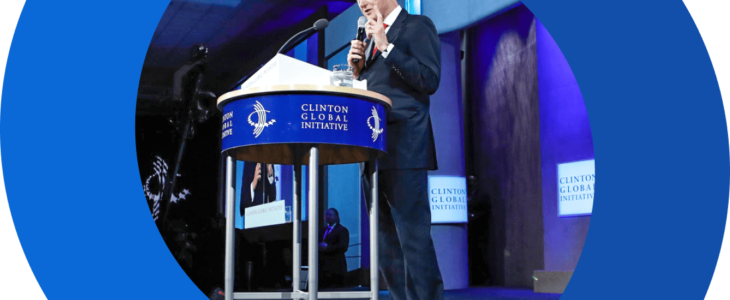
Former President Bill Clinton is calling on governments, businesses, philanthropies and other prominent institutions to draw together and help a world that is “on fire” as he reconvenes the Clinton Global Initiative, the meeting of international leaders, for the first time since 2016.
“Somebody needs to show up and make something good happen,” he said during the conference’s opening public session Monday. “That’s what we’re trying to do.”

Interest in the two-day meeting has been so intense that the Clinton Foundation had to turn away more than 1,000 potential attendees. It is convening a spectrum of luminaries, including Jordan’s Queen Rania Al Abdullah, Barbados Prime Minister Mia Mottley, BlackRock CEO Larry Fink, Nobel Peace Prize winner Malala Yousafzai and actor and water access activist Matt Damon.
Clinton, president of the United States from 1993 to 2001, said he has been amazed by the massive response.

“The world’s on fire in a lot of different ways,” he told The Associated Press in an interview. “But there are a lot of things that businesses, non-governmental groups and governments working together can do to help with a lot of these problems.”
The Clinton Global Initiative, or CGI, has helped more than 435 million people in more than 180 countries since it was established in 2005. It previously required attendees to create a Commitment to Action, a measurable project that addresses a global issue, though for this first year, everyone will be expected to announce or develop a partnership. Those commitments often unite new partners and encourage cooperation between the public and private sectors.
“I think there is a longing for people to get together and meet with an end in mind,” Clinton said in an interview. “Not just talk about it, but knowing that when they walk away, they will have committed to doing something.”
Clinton Foundation Vice Chair Chelsea Clinton calls that “a bias toward action,” which she says is part of what makes CGI special and a catalyst for global change. She said the COVID-19 pandemic has energized interest in public health and addressing health disparities because people outside of the field could see the impact.
“Health is interconnected to anything and everything that anyone may care about,” Chelsea Clinton said. “There are a lot of people who now are mobilized to do something with what they have come to newly understand and which they now feel responsible for helping to solve.”
Dr. David Fajgenbaum received a standing ovation as he announced plans for his new nonprofit Every Cure, which seeks to find new uses for generic drugs to treat rare diseases. The idea came from his own research to find a treatment for his own Castleman’s Disease, a rare ailment where the immune system attacks vital organs.
He said his new nonprofit would work on using generic drugs to treat 106 rare disease initially, a process that would cost 500 times less than developing a new drug. “There would be no greater impact in terms of saving lives,” he said. “As long as I’m alive, we’re going to continue to chase them.”
In other commitments, Andrew Kuper, founder and CEO of impact investing firm LeapFrog Investments, announced the firm planned to support 25 million enterprises offering 100 million jobs in developing countries by 2030. Israeli global venture firm OurCrowd announced a partnership with the WHO Foundation to launch a $200 million Global Health Equity Fund that focuses on breakthrough technology solutions in health care.
Peter Sands, executive director of The Global Fund to Fight AIDS, Tuberculosis and Malaria, said CGI has always introduced his group to new potential partners, something even more valuable after two challenging pandemic years that made access to new donors difficult. “There’s only so much you can do with PowerPoints and Zooms,” Sands said.
He is currently in the midst of a fundraising campaign of his own. President Joe Biden will host The Global Fund’s Seventh Replenishment Conference in New York on Wednesday, delayed two days so that Biden can attend the funeral of Queen Elizabeth II on Monday.
However, he now plans to attend CGI and said the gathering has been missed during its hiatus, even though the Clinton Foundation itself has remained active. The initiative convened annually until 2016 during former Sen. Hillary Clinton’s presidential campaign, when questions were raised about the appearance of potential conflicts of interests if donors then had business before her administration.
Bill Clinton said the initiative is counting on the special energy of its participants to tackle a growing number of issues.
“We’ve got the largest number of migrants since World War II,” he said. “And the most publicity they get in America is when one governor or two turns it into some political issue and tries to make problems for other people. Sensible countries work together and try to figure out the best way to deal with it.”
Clinton also hopes CGI can spotlight various solutions that need more support. He points to a study from Generation180, a nonprofit that promotes the use of clean energy. Its research shows some rural schools have installed solar panels to reduce their carbon emissions and their electric bills. The schools then used the savings to give raises to teachers.
“The energy is here. The jobs are here. The benefits are here. The kids win,” Clinton said. “That shouldn’t be a political issue.”
He says philanthropy can help bust through political and cultural gridlock by showing what can be done. For example, he said that when President Barack Obama proposed hiring 100,000 new STEM teachers and Congress turned him down, philanthropy stepped in to make it happen.
“We got the Carnegie Corporation and the American Federation of Teachers and more than 20 other partners together and they said, ‘We will raise the money,'” Clinton said. “Nobody ever thought of that as being a purpose of philanthropy. But it got the job done, and it demonstrated why Republicans and Democrats should cooperate on such things.”
Credit: Yahoo News
